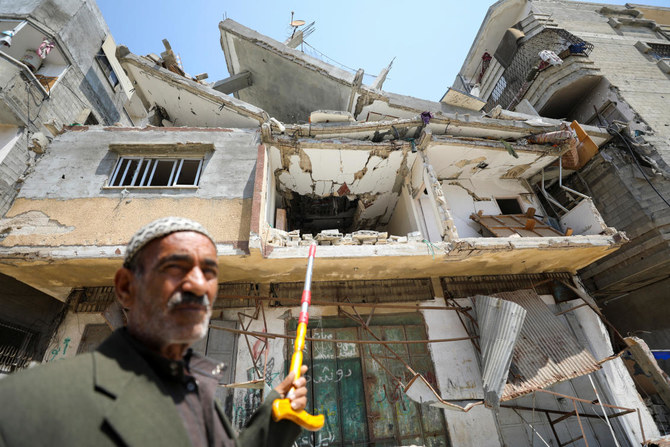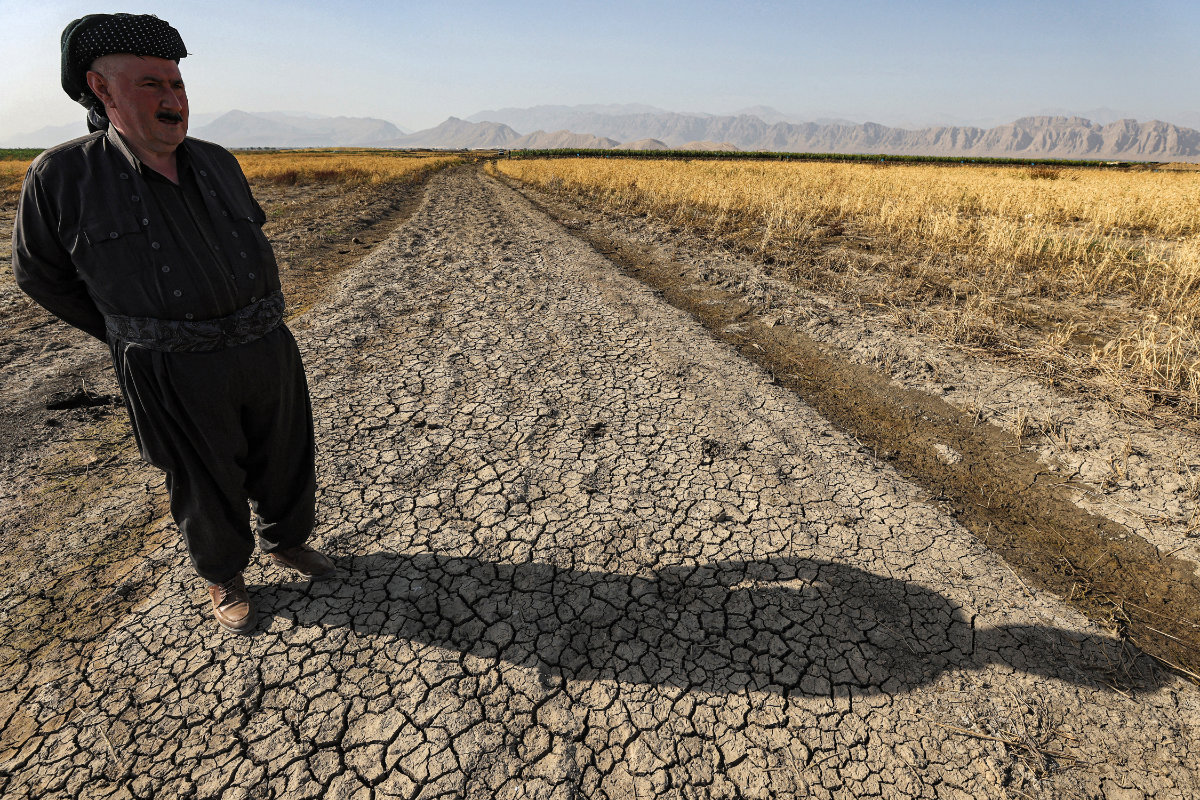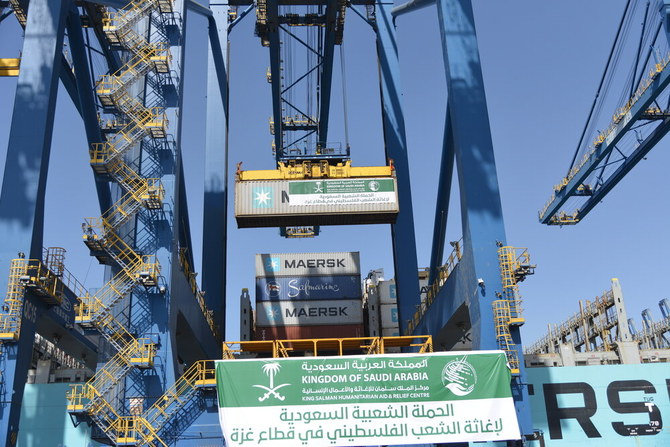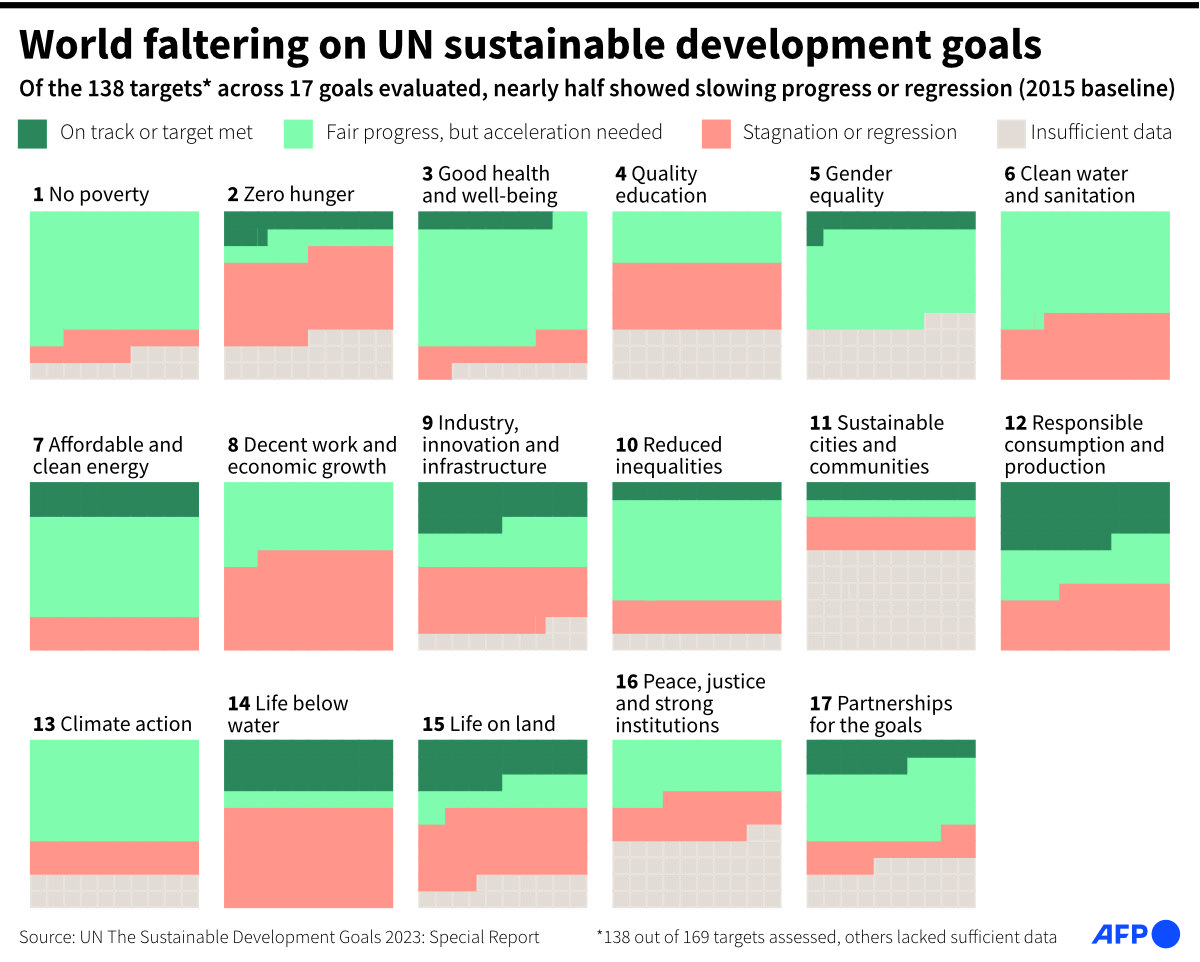GAZA: When an Israeli airstrike destroyed his family’s home in November, Zein Oroq was pinned under rubble. He was wounded but survived, while 17 members of his extended family died.
But Zein, 13, would later suffer a cruel fate in Gaza, where Palestinians face severe shortages of medicine, food and water in a deepening humanitarian crisis.
The population of the tiny enclave, where Israel and the Palestinian Islamist group Hamas have been fighting for more than six months, is at risk of famine.
Last week, during an air drop of aid, the teenager was struck by one of the packages as he rushed to try to get a can of fava beans, some rice or flour.
“The first time, when the house was hit by a strike, he came out from under the rubble with wounds in his head, hand and leg, God saved him,” said Zein’s grandfather, Ali Oroq.
The grandfather, standing by a large pool of wastewater, recalled how Zein would swim in a pond to get a meal from the air drops, and how he should have been sitting at a desk in school getting an education instead.
But, with mediators failing to secure a truce and Israel and Hamas braced for more war in Gaza, which has been rendered a wasteland by the fighting, his luck eventually ran out.
“While parachutes were falling, an aid box hit his head, also the stampede of people who were heading toward the box did not pay attention to the boy — they were also hungry,” said his father Mahmoud.
“So, his head was cut and wounded, he got fractures in the pelvis, skull and abdomen and with the flow of people, the pressure increased on him.”
Zein was taken to hospital, where he succumbed to his wounds on Sunday in the chaos of a war that began when Hamas militants attacked Israel on Oct. 7, killing 1,200 people and taking more than 200 hostage, according to Israeli tallies.
Israel responded with a fierce offensive that has killed more than 33,000 Palestinians, according to Gaza’s Hamas-run health authorities, and turned much of densely populated strip, home to 2.3 million people, into rubble, twisted steel and dust.
“My son is so precious, he was my support, my entire life, my first joy in this world, my biggest child, may he rest in peace,” said Mahmoud.
After surviving airstrike Palestinian boy dies seeking aid
After surviving airstrike Palestinian boy dies seeking aid

- The teenager was struck by one of the packages as he rushed to try to get a can of fava beans
Heat wave forces Iran to shutter government offices and banks. Electricity consumption soars

- Banks, offices, and public institutions across the country close to protect people’s health and conserve energy, due to extreme temperatures
TEHRAN: A heat wave blanketing Iran has forced authorities to cut operating hours at various facilities Saturday and order all government and commercial institutions to shutter on Sunday.
The temperature ranged from 37 degrees Celsius (98.6 degrees Fahrenheit) to 42 C (about 107 F) in the capital, Tehran on Saturday, according to weather reports.
State-run IRNA news agency said banks, offices, and public institutions across the country would close on Sunday to protect people’s health and conserve energy, due to extreme temperatures and that only emergency services and medical agencies would be excluded.
Authorities also cut working hours on Saturday in many provinces due to the sweltering heat, IRNA reported, adding that high temperatures, over 40 C (104 F), have been registered in Tehran since Friday.
Iranian media warned people to stay indoors until 5 p.m. local time.
Authorities also said electricity consumption reached record levels of 78,106 megawatts on Tuesday.
Nournews, close to Iran’s Supreme National Security Council, reported Wednesday that Iran’s temperature is rising at twice the pace of the global temperature which has increased by more than one degree compared to the long-term average. Meanwhile, Iran has become warmer by 2 degrees over the past 50 years, the agency said.
Last year, Iran ordered a two-day nationwide holiday due to increasing temperatures.
170 killed in days-long Israeli operation, says Gaza civil defense

- Deir Al-Balah is one of the areas most populated with displaced families, and said over 100 others were wounded
GAZA: Gaza’s civil defense agency said Saturday that Israel’s military operation around Khan Yunis has killed about 170 people and wounded hundreds since it started on Monday.
“Since the beginning of the Israeli military operation in the Khan Yunis area, we are talking of approximately 170 martyrs and hundreds of wounded,” agency spokesman Mahmud Bassal told AFP.
He said many people had been displaced again on Saturday as the Israeli operation continued.
“The questions is where will these residents go?” Basal said.
“Anyone who sees the situation in Khan Yunis will witness thousands of people spread out on the ground, on the roads, in areas that unfortunately are not suitable for living.
“With no other options available, they are exposing themselves to death.”
Earlier on Saturday the military issued new evacuation orders for residents of the southern city, after retrieving the bodies of five Israelis and warning of new operations.
The United Nations said more than 180,000 Palestinians have fled Khan Yunis since the Israeli operation began on Monday.
The evacuation orders and “intensified hostilities” have “significantly destabilized aid operations,” it added, reporting “dire water, hygiene and sanitation conditions” across the Palestinian territory.
The Israeli military said it launched the operation to halt rocket fire from the area, which already saw heavy fighting earlier this year.
On Wednesday, it said troops had retrieved the bodies of five Israelis from the area.
They had been killed during the Hamas attacks of October 7 and their bodies taken back to Gaza, the military said.
On Saturday, it ordered residents from more parts of Khan Yunis “to temporarily evacuate to the adjusted humanitarian area in Al-Mawasi” — the second such adjustment made to the safe zone within a week.
Israel orders the evacuation of an area designated as a humanitarian zone in Gaza

- The war in Gaza has killed more than 39,100 Palestinians, according to the territory’s Health Ministry
KHAN YOUNIS: Israel’s military ordered the evacuation Saturday of a crowded part of Gaza designated as a humanitarian zone, saying it is planning an operation against Hamas militants in Khan Younis, including parts of Muwasi, a makeshift tent camp where thousands are seeking refuge.
The order comes in response to rocket fire that Israel says originates from the area. It’s the second evacuation issued in a week in an area designated for Palestinians fleeing other parts of Gaza. Many Palestinians have been uprooted multiple times in search of safety during Israel’s punishing air and ground campaign.
On Monday, after the evacuation order, multiple Israeli airstrikes hit around Khan Younis, killing at least 70 people, according to Gaza’s Health Ministry, citing figures from Nasser Hospital.
The area is part of a 60-square-kilometer (roughly 20-square-mile) “humanitarian zone” to which Israel has been telling Palestinians to flee to throughout the war. Much of the area is blanketed with tent camps that lack sanitation and medical facilities and have limited access to aid, United Nations and humanitarian groups say. About 1.8 million Palestinians are sheltering there, according to Israel’s estimates. That’s more than half Gaza’s pre-war population of 2.3 million.
The war in Gaza has killed more than 39,100 Palestinians, according to the territory’s Health Ministry, which doesn’t distinguish between combatants and civilians in its count. The UN estimated in February that some 17,000 children in the territory are now unaccompanied, and the number is likely to have grown since.
The war began with an assault by Hamas militants on southern Israel on Oct. 7 that killed 1,200 people, most of them civilians, and took about 250 hostages. About 115 are still in Gaza, about a third of them believed to be dead, according to Israeli authorities.
WHO sends over 1 mln polio vaccines to Gaza to protect children

- Israel’s military said it would start offering the vaccine to soldiers in the Gaza Strip after remnants of the virus were found in test samples
- Besides polio, the UN has reported an increase in cases of Hepatitis A, dysentery and gastroenteritis as sanitary conditions deteriorate in Gaza
GENEVA: The World Health Organization is sending more than one million polio vaccines to Gaza to be administered over the coming weeks to prevent children being infected after the virus was detected in sewage samples, its chief said on Friday.
“While no cases of polio have been recorded yet, without immediate action, it is just a matter of time before it reaches the thousands of children who have been left unprotected,” Director-General Tedros Adhanom Ghebreyesus said in an opinion piece in Britain’s The Guardian newspaper.
He wrote that children under five were most at risk from the viral disease, and especially infants under two since normal vaccination campaigns have been disrupted by more than nine months of conflict.
Poliomyelitis, which is spread mainly through the fecal-oral route, is a highly infectious virus that can invade the nervous system and cause paralysis. Cases of polio have declined by 99 percent worldwide since 1988 thanks to mass vaccination campaigns and efforts continue to eradicate it completely.
Israel’s military said on Sunday it would start offering the polio vaccine to soldiers serving in the Gaza Strip after remnants of the virus were found in test samples in the enclave.
Besides polio, the UN reported last week a widespread increase in cases of Hepatitis A, dysentery and gastroenteritis as sanitary conditions deteriorate in Gaza, with sewage spilling into the streets near some camps for displaced people.
How climate change is exacerbating food insecurity, with dangerous consequences for import-reliant Middle East

- UN report show nations are falling well short of achieving the Sustainable Development Goal of eliminating hunger by 2030
- FAO expert warns that climate shocks could lead to more conflict in the region over limited access to water and resources
RIYADH: Global food insecurity is far worse than previously thought. That is the conclusion of the State of Food Security and Nutrition in the World 2024 report published this week by a coalition of UN entities, which found that efforts to tackle undernourishment had suffered serious setbacks.
As countries across the world fall significantly short of achieving the second UN Sustainable Development Goal of “zero hunger” by 2030, the report notes that climate change is increasingly recognized as a pivotal factor exacerbating hunger and food insecurity.

As a major food importer, the Middle East and North Africa region is considered especially vulnerable to climate-induced crop failures in source nations and the resulting imposition of protectionist tariffs and fluctuations in commodity prices.
“Climate change is a driver of food insecurity for the Middle East, where both the global shock and the local shock matter,” David Laborde, director of the Agrifood Economics and Policy Division at the Food and Agriculture Organization of the UN, told Arab News.
“Now, especially for the Middle East, I think that the global angle is important because the Middle East is importing a lot of food. Even if you don’t have a (climate) shock at home, if you don’t have a drought or flood at home — if it’s happened in Pakistan, if it’s happened in India, if it’s happened in Canada — the Middle East will feel it.”
Opinion
This section contains relevant reference points, placed in (Opinion field)
The State of Food Security and Nutrition in the World report has been compiled annually since 1999 by FAO, the International Fund for Agricultural Development, the UN Children’s Fund, the World Food Programme, and the World Health Organization to monitor global progress toward ending hunger.
During a recent event at the UN headquarters in New York, the report’s authors emphasized the urgent need for creative and fair solutions to address the financial shortfall for helping those nations experiencing severe hunger and malnutrition made worse by climate change.
In addition to climate change, the report found that factors like conflict and economic downturns are becoming increasingly frequent and severe, impacting the affordability of a healthy diet, unhealthy food environments, and inequality.

Indeed, food insecurity and malnutrition are intensifying due to persistent food price inflation, which has undermined economic progress globally.
“There is also an indirect effect that we should not neglect — how climate shock interacts with conflict,” said Laborde.
In North Africa, for example, negative climate shocks can lead to more conflict, “either because people start to compete for natural resources, access to water, or just because you may also have some people in your area that have nothing else to do,” he said.
“There are no jobs, they cannot work on their farm, and so they can join insurgencies or other elements.”
DID YOUKNOW?
Up to 757 million people endured hunger in 2023 — the equivalent of one in 11 worldwide and one in five in Africa.
Global prevalence of food insecurity has remained unchanged for three consecutive years, despite progress in Latin America.
There has been some improvement in the global prevalence of stunting and wasting among children under five.
In late 2021, G20 countries pledged to take $100 billion worth of unused Special Drawing Rights, held in the central banks of high-income countries and allocate them to middle- and low-income countries.
Since then, however, this pledged amount has fallen $13 billion short, with those countries with the worst economic conditions receiving less than 1 percent of this support.

Saudi Arabia is one of the countries that has exceeded its 20 percent pledge, alongside Australia, Canada, China, France, and Japan, while others have failed to reach 10 percent or have ceased engagement altogether.
“Saudi Arabia is a very large state in the Middle East, so what they do is important, but also they have a financial capacity that many other countries don’t,” said Laborde.
“It can be through their SDRs. It can also be through their sovereign fund because where you invest matters and how you invest matters to make the world more sustainable. So, I will say yes, prioritizing investment in low- and middle-income countries on food and security and nutrition-related programs can be important.

Although the prevalence of undernourishment in Saudi Arabia has fallen in recent years, the report shows that the rate of stunting in children has actually increased by 1.4 percent in the past 10 years.
There has also been an increase in the rates of overweight children, obesity, and anemia in women as the population continues to grow. In this sense, it is not so much a lack of food but a dearth of healthy eating habits.
“Saudi Arabia is a good example where I would say traditional hunger and the lack of food … become less and less a problem, but other forms of malnutrition become actually what is important,” said Laborde.

In 2023, some 2.33 billion people worldwide faced moderate or severe food insecurity, and one in 11 people faced hunger, made worse by various factors such as economic decline and climate change.
The affordability of healthy diets is also a critical issue, particularly in low-income countries where more than 71 percent of the population cannot afford adequate nutrition.
In countries like Saudi Arabia where overeating is a rising issue, Laborde suggests that proper investment in nutrition and health education as well as policy adaptation may be the way to go.
While the Kingdom continues to extend support to countries in crisis, including Palestine, Sudan, and Yemen, through its humanitarian arm KSrelief, these states continue to grapple with dire conditions. Gaza in particular has suffered as a result of the war with Israel.

“Even before the beginning of the conflict, especially at the end of last year, the situation in Palestine was complicated, both in terms of agricultural system (and) density of population. There was already a problem of malnutrition,” said Laborde.
“Now, something that is true everywhere, in Sudan, in Yemen, in Palestine, when you start to add conflict and military operations, the population suffers a lot because you can actually destroy production. You destroy access to water. But people also cannot go to the grocery shop when the truck or the ship bringing food is disrupted.”
While Palestine and Sudan are the extreme cases, there are still approximately 733 million people worldwide facing hunger, marking a continuation of the high levels observed over the past three years.

“On the ground, we work with the World Food Programme (and) with other organizations, aimed at bringing food to the people in need in Palestine,” Laborde said of FAO’s work. “Before the conflict and after, we will also be working on rebuilding things that need to be rebuilt. But without peace, there are limited things we can do.”
FAO helps food-insecure nations by bringing better seeds, animals, technologies, and irrigation solutions to develop production systems, while also working to protect livestock from pests and disease by providing veterinary services and creating incentives for countries to adopt better policies.
The report’s projections for 2030 suggest that around 582 million people will continue to suffer from chronic undernourishment, half of them in Africa. This mirrors levels observed in 2015 when the SDGs were adopted, indicating a plateau in progress.

The report emphasizes the need to create better systems of financial distribution as per this year’s theme: “Financing to end hunger, food insecurity and all forms of malnutrition.”
“In 2022, there were a lot of headlines about global hunger, but today, this has more or less disappeared when the numbers and the people that are hungry have not disappeared,” said Laborde, referring to the detrimental impact of the war in Ukraine on world food prices.
“We have to say that we are not delivering on the promises that policymakers have made. The world today produces enough food, so it’s much more about how we distribute it, how we give access. It’s a man-made problem, and so it should be a man-made solution.”
















